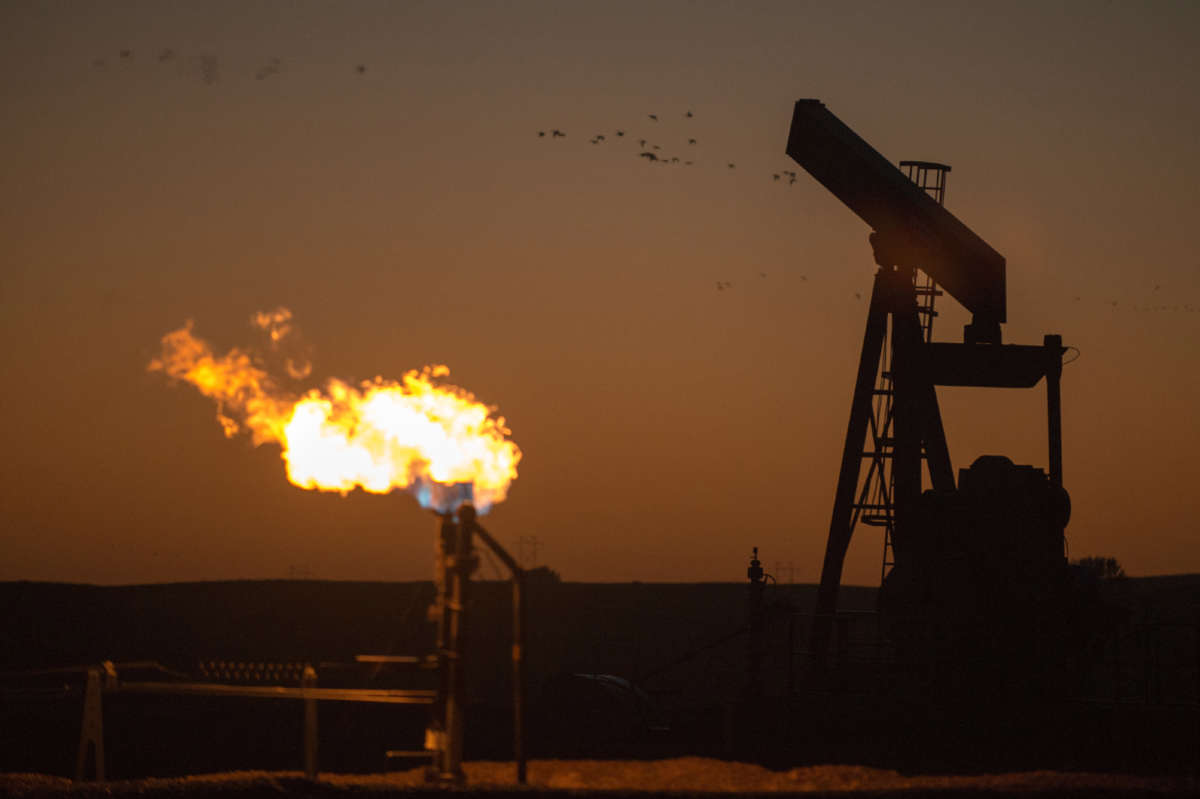Dire new research published Tuesday estimates that rich countries must end oil and gas production entirely by 2034 to give the world a 50% chance of limiting warming to 1.5°C by the close of the century — the Paris accord’s most ambitious climate target.
Assembled by experts at the United Kingdom-based Tyndall Centre for Climate Change Research, the report finds that “immediate and deep cuts in the production of all fossil fuels” are needed worldwide to avert the worst of the ongoing climate emergency.
“There are no exceptions; all nations need to begin a rapid and just phaseout of existing production,” the analysis states. “There is no capacity in the carbon budget for opening up new production facilities of any kind, whether coal mines, oil wells, or gas terminals. A transition based on principles of equity requires wealthy, high-emitting nations to phase out all oil and gas production by 2034 while the poorest nations have until 2050 to end production.”
Despite the catastrophic consequences of inaction, the report warns, no government is currently considering — let alone moving with urgency to implement — the kind of rapid fossil fuel phaseout needed to prevent future climate chaos that could render huge swaths of the globe uninhabitable.
“For the wealthiest group of ‘producer nations,’ with the highest capacity to achieve a ‘just transition,’ output of oil and gas needs to be cut by 74% by 2030, with complete phaseout by 2034,” the report argues. “For the middle-income group with medium capacity for a just transition, the timeframe extends a little, with a 28% cut by 2030, and a zero-production year of 2043. For the poorest group with [the] lowest capacity, a 14% cut is required by 2030, with all production ended by 2050.”
The highest-capacity group is made up of 19 countries, including the United States, Canada, the U.K., Norway, Australia, and the United Arab Emirates.
“Although poorer countries have longer to phase out oil and gas production, many will be hit hard by the loss of revenue with an attendant risk of political instability,” the report adds. “An equitable transition will require wealthy high-emitting nations make substantial and ongoing financial transfers to poorer nations to facilitate their low-carbon development, against a backdrop of dangerous and increasing climate impacts.”
The report, led by University of Manchester professor Kevin Anderson, comes a day after United Nations Secretary-General António Guterres warned that the 1.5°C warming target is “on life support” as rich countries refuse to break their “addiction to fossil fuels.”
A U.N. analysis published in September found that under current emissions pledges from governments around the world, the planet is heading toward 2.7°C of warming by 2100 — a nightmare scenario that would mean increasingly devastating extreme weather, the destruction of key habitats, and much more.
To “keep 1.5 alive” US, Norway, UK & other wealthy oil & gas producers must stop production by 2034. Poorest producers have until 2050. New report https://t.co/mxQUICJjZi But all nations need to begin phaseout now. 1.5°C means no more fudges, lies & scams; i.e. no new production!
— Kevin Anderson (@KevinClimate) March 22, 2022
Romain Ioualalen, global policy lead at Oil Change International (OCI), said in a statement Tuesday that the Tyndall Centre’s new research “highlights the deep and profoundly unjust consequences of climate inaction by rich producing countries: their continued reliance on fossil fuels has depleted the carbon budget to such an extent that even the poorest countries would need to stop producing a mere 15 years after the richest ones.”
“This report is a stark indictment of the climate failure of rich countries,” Ioualalen argued. “Rich countries have twelve years to end their production of oil and gas, but none has any plans to do so.”
OCI estimates that rich countries are currently planning to produce five times as much oil and gas in 2030 as the new report says is compatible with keeping warming below 1.5°C.
“As the world grapples with Russia’s tragic invasion of Ukraine, Big Oil and Gas are attempting to harness the crisis to boost shareholder profits and lock in decades more pollution,” said Collin Rees, OCI’s United States lead. “Oil and gas boosters claim more fossil fuels are the answer, but nothing could be further from the truth.”
“Rich nations like the United States must resist cynical calls to commit to a fossil-fueled future and instead act first and fastest to carefully phase out their own extraction while funding other countries to transition away from fossil fuel production,” Rees continued. “Global equity demands swift action to preserve a manageable transition — [President] Joe Biden, [California Gov.] Gavin Newsom, and other U.S. leaders must heed this call while there’s still time.”
4 Days Left: All gifts to Truthout now matched!
From now until the end of the year, all donations to Truthout will be matched dollar for dollar! Thanks to a generous supporter, your one-time gift today will be matched immediately. As well, your monthly donation will be matched for the whole first year, doubling your impact.
We have just 4 days left to reach our goals: raising $62,000 in one-time gifts and adding 930 new monthly donors.
This matching gift comes at a critical time. Trump has made it no secret that he is planning a demolition-style attack on both specific communities and democracy as a whole, beginning on his first day in office.
Help us prepare for Trump’s Day One, and have your donation matched today!
